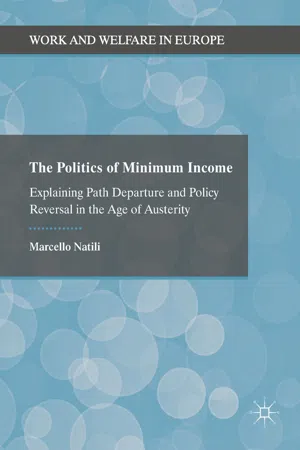Introduction
Over the past twenty years, minimum income schemes (MIS) have become key social protection institutions for European citizens (Emmenegger et al. 2012; Marx 2007; Marx and Nelson 2012; Saraceno 2015). Accordingly, the literature addressing the institutional configuration and recent transformations of MIS in Europe has increased significantly (Bahle et al. 2011; Ferrera 2005; Frazer and Marlier 2009, 2016; Lodemel and Moreira 2014; Marchal et al. 2014; Marchal and Van Mechelen 2017; Marx 2007; Marx and Nelson 2012; Moreira 2008). This literature has systematically studied the dimensions of the variation among MIS in Europe (Bahle et al. 2011; Marx and Nelson 2012; Lodemel and Moreira 2014). Furthermore, it has convincingly argued that MIS have transformed their function and scope in recent decades, shifting from residual anti-poverty transfers to complex programmes that combine monetary benefits, access to social services and participation in social and labour-market reintegration measures (Hemerijk 2012; Lodemel and Trickey 2001; Lodemel and Moreira 2014; Moreira 2008). Emerging challenges such as atypical employment, frequently interrupted careers, in-work poverty, long-term unemployment, family instability and a lack of opportunity to participate in the labour market for an increasing share of the population have contributed to this transformation (Bonoli 2005; Cantillon and Vandenbroucke 2013; Marx 2007; Saraceno 2015).
Nevertheless, there are at least two important gaps in the literature. First, only a few contributions have focused on the politics of MIS (see Kevins 2015, 2017; Jessoula et al. 2014, Lalioti 2016, Vlandas 2013). Although there is a vast range of political science literature on pensions, health care and labour-market policy, we know little about the political dimension of MIS. What are the main interest groups active in this policy field? What are the preferences of different political parties—conservative, liberal, radical right, social democratic and/or post-communist? Second, the logic and dynamics of institutional change in this sector remain largely under-theorized (Clegg 2013), and an analytical model that would facilitate an understanding of the scope and direction of recent reforms is still lacking. The key question is thus as follows: Under what conditions are MISs introduced, expanded or, conversely, retrenched?
Against this background, the proposed volume presents a comparative analysis of policy trajectories of MIS in Italy and Spain between the mid-1980s and 2015. Although the recent evolution of MIS in these countries has not been the subject of in-depth studies, 1 a comparison seems particularly promising in various respects. Indeed, although the two countries had similar points of departure and faced comparable functional pressures and institutional constraints, they experienced remarkably different developments in the last two decades. At the end of the 1980s, they were—together with Greece and Portugal—the only countries in ‘Old Europe’ where full-fledged MIS were missing. In Spain, although a national scheme was never established, all the Autonomous Communities subsequently introduced regional MIS, which were later expanded. These schemes currently cover the entire national territory and may be regarded as almost universal despite significant variations in the organization, funding, benefit level and programme design (Arriba and Moreno 2005; Guillén 2010). In Italy, after a centre-left government launched an experimental national MIS (1998) that was later discontinued by the newly appointed centre-right cabinet (Jessoula and Alti 2010), some regions introduced last-resort anti-poverty programmes. Unlike Spain, however, these measures did not cover the entire country and, more importantly, most regional MIS were soon repealed.
Two empirical and theoretical puzzles therefore emerge. First, the introduction of regional MIS in Italy and Spain constitutes a path departure from the original Southern European model of welfare—characterized by the absence of a social safety net for the active population and reliance on intra-household redistribution, kin networks and Church organizations (Ferrera 1996)—which calls for an explanation.
The second puzzle refers to the divergent policy trajectories of regional MIS in Italy and Spain after their introduction. What explains the process of gradual institutionalization of regional safety nets in Spain vis à vis failed institutionalization and even policy reversal in Italy?
The proposed volume addresses these puzzles by presenting a comparative historical analysis of the development of MIS in the two countries from the first legislative proposals in the 1980s and the introduction of regional MIS in the 1990s–2000s to their institutionalization (Spain) and elimination (Italy) during the Great Recession (2008–2014). The core of the analysis is a detailed, process-oriented investigation of minimum income reforms in four selected regional cases: The Community of Madrid (CoM) and Castile and Léon (CyL) in Spain and Friuli Venezia Giulia (FVG) and Lazio in Italy. These regional case studies allow an investigation into the specific political mechanisms underlying institutional change dynamics in the field of minimum income in Italy and Spain.
The volume has three main aims. First, it presents a detailed analysis of the differentiated evolution of MIS in Italy and Spain, with the institutionalization of a regional minimum income model in Spain and the failure to do so in Italy. This is complemented by a description of the (peculiar) national MIS implemented since January 2018 in Italy.
Second, the volume aspires to deepen the knowledge of the politics of social assistance, especially minimum income policies. The comparative analysis describes the political processes and identifies the specific factors and mechanisms leading to different minimum income reforms in Italy and Spain in the period of 1988–2014. It identifies the most influential Italian and Spanish interest groups in this policy area i.e., trade unions, faith-based associations, and social movements, and rec...
